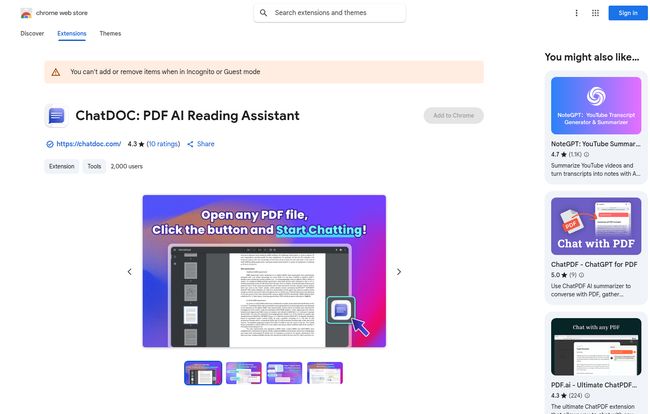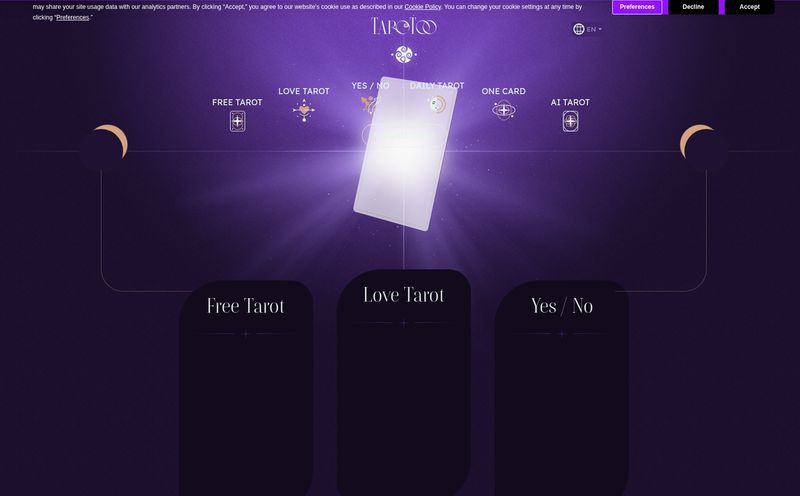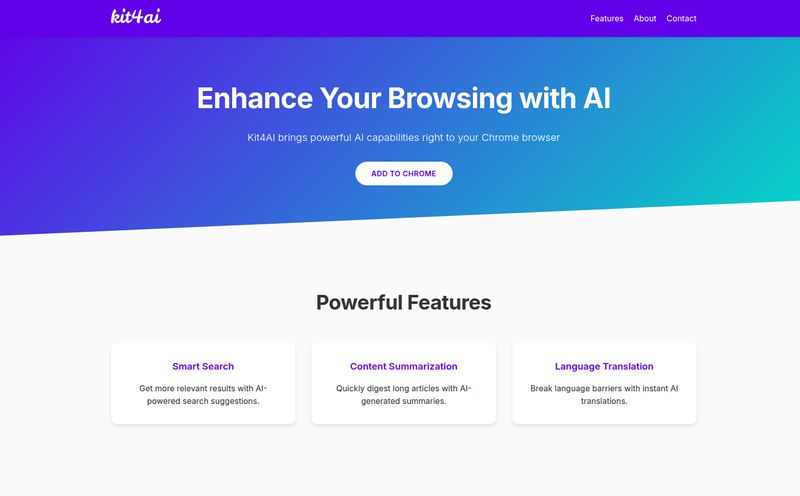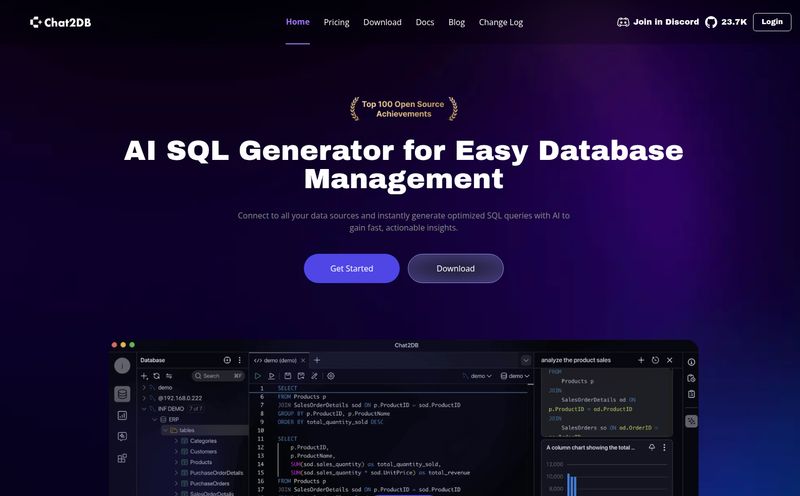If your desktop looks anything like mine, it’s a chaotic graveyard of PDFs. You've got research papers from three months ago, client reports you swore you'd read, ebooks you downloaded on a whim, and that one 150-page manual for a gadget you no longer own. We're all drowning in digital paper. It's a modern-day curse for anyone who works with, well, information. For years I've been looking for a better way to manage this, and lately, the tech world has been screaming one answer at me: AI.
The Chrome Web Store is absolutely flooded with AI-powered extensions, all promising to change my life. Most of them, frankly, are a bit underwhelming. But every now and then, you stumble across something that makes you go, “Huh. Okay, this is actually useful.” That was my reaction to ChatDOC. It calls itself a PDF AI Reading Assistant, and I decided to take it for a spin to see if it could actually live up to the hype.

Visit ChatDOC
So, What's the Big Deal with ChatDOC?
In the simplest terms, ChatDOC is a tool that lets you talk to your documents. I know, it sounds like something out of a sci-fi movie, but it's surprisingly practical. You upload a file—and not just PDFs, which is a huge plus—and it basically becomes your personal research assistant for that document. It's built on ChatGPT, so it has that conversational intelligence we've all gotten used to, but it's laser-focused on the content you provide. No more getting sidetracked by AI-written poems about cheese when you're trying to find a specific data point in a financial report.
One of the first things that caught my eye was its file compatibility. We're talking support for PDF, DOC, DOCX, MD, and even EPUB. For someone who gets sent documents in every format under the sun, this versatility is a massive win. It means I don't need five different tools to do one job.
My Experience Using ChatDOC's Best Features
Getting started was painless. It's a Chrome extension, so a couple of clicks and it's installed. You do have to make an account, which is a minor hoop to jump through, but pretty standard for most services these days. Once I was in, I decided to throw a few different document types at it to see what would stick.
Having a Conversation with Your Files
This is the core functionality, and it works just as advertised. I uploaded a dense marketing analytics report I'd been putting off. Instead of painstakingly reading all 40 pages, I just started asking questions.
What was the YoY growth for Q2?
Summarize the key takeaways from the 'Social Media Performance' section.
Find all mentions of our competitor, 'MegaCorp'.
Within seconds, I had answers. It felt less like work and more like interviewing an expert who had already memorized the entire document. It’s like having a junior analyst on speed dial, ready to pull facts and figures on command. The time-saving potential here is just... immense.
Cited Sources: The Feature That Builds Trust
Here's where ChatDOC really won me over. One of my biggest beefs with generative AI is its tendency to, shall we say, confidently make things up. Hallucinations are a real problem. ChatDOC tackles this head-on by providing cited sources for its answers. Every piece of information it gives you is linked back to the exact page and paragraph in the original document. You can just click the footnote and it takes you right there. For anyone in academia, law, or just a healthy skeptic like me, this feature is non-negotiable. It transforms the tool from a cool gimmick into a genuinely reliable research partner.
Going Wide with Multi-Document Queries
This is the power move. You can upload a collection of related documents into a folder and then ask questions across all of them at once. Imagine you're a student writing a literature review. You can upload 10 different academic papers and ask, “What is the common consensus on the effect of caffeine on productivity?” ChatDOC will scan all ten papers and synthesize an answer, citing which paper each piece of information came from. I tried this with a few articles on SEO trends, and it was brilliant for spotting patterns and contrasting viewpoints without having 15 browser tabs open.
It also claims to understand tables and images, which is a step above many other text-focused AIs. My tests with tables were pretty solid; it could pull specific data points accurately. Image analysis is still an evolving field for all AIs, so your mileage may vary, but the fact that it's even attempting it is a good sign.
The Good, The Bad, and The Realistic
No tool is perfect, right? After playing with it for a while, here's my balanced perspective.
The good stuff is obvious. The speed is phenomenal. The accuracy, thanks to the citations, feels trustworthy. And the ability to work across multiple files and formats makes it incredibly versatile. It's a genuine productivity booster.
On the flip side, there are a few things to keep in mind. As I mentioned, you have to create an account. It's a small thing, but some people are allergic to new sign-ups. More importantly, the tool's effectiveness is directly tied to the quality of your document. A crisp, digitally native PDF will work flawlessly. A grainy, scanned-in-sideways document from 1998? Not so much. It's the classic 'garbage in, garbage out' principle. You can't expect the AI to magically decipher a horribly formatted or low-quality source.
Also, while it's fantastic for extracting facts and summaries, I wouldn't rely on it for interpreting documents that require deep contextual or emotional nuance. But for 90% of the research and data-extraction tasks I face, it's more than capable.
So, What Does ChatDOC Cost?
This is the million-dollar question for any new tool. As of my review, the ChatDOC Chrome extension appears to be free to install and use. I couldn't find a dedicated pricing page linked from the store, which suggests they might be operating on a freemium model or are still in a growth phase. My advice? Check their official website for the most up-to-date information. Companies can and do change their pricing strategies, so it's always best to check the source.
Who Should Be Using ChatDOC Immediately?
I can see a few groups of people who would get immediate value from this tool:
- Students and Researchers: This is a no-brainer. The ability to tear through research papers and synthesize information is a superpower for writing essays and literature reviews.
- Business Analysts and Marketers: Quickly extract KPIs, competitive mentions, and market data from dense reports. Saves hours of manual work.
- Legal and Finance Professionals: Great for initial fact-finding in long contracts or financial statements. The citation feature is especially critical here (though I'd still have a human lawyer give the final sign-off, obviously).
- Anyone Who's Curious: If you've ever downloaded a long document and thought, "I'll get to this later," this tool is your 'later'.
Final Thoughts: Is It Worth a Click?
In a sea of over-hyped AI tools, ChatDOC feels different. It's practical. It solves a real, tangible problem, and it does it with a well-thought-out feature set. The emphasis on citations alone makes it stand out from the crowd.
It won't read your mind, and it won't make sense of a coffee-stained napkin you scanned, but it will absolutely change the way you interact with your digital documents. It turns the passive act of reading into an active, dynamic conversation. For me, it's earned a permanent spot on my browser toolbar. If you're tired of the PDF pile-up, you should definitely give it a try.
Frequently Asked Questions About ChatDOC
- What exactly is ChatDOC?
- ChatDOC is an AI-powered reading assistant, available as a Chrome extension. It lets you upload various document types (like PDF, DOCX, EPUB) and ask questions about their content, getting instant, sourced answers.
- Is ChatDOC free to use?
- At the time of this review, the Chrome extension is free to install and use. It's always a good idea to check the official ChatDOC website for the latest pricing or information on any premium features.
- What kinds of files can I use with ChatDOC?
- It supports a wide range of formats, including PDF, DOC, DOCX, MD (Markdown), and EPUB. This makes it much more versatile than tools that only handle PDFs.
- How accurate are the answers from ChatDOC?
- The accuracy is generally very high, especially with well-structured, clear documents. Its best feature is that every answer includes a citation, linking you directly to the source text in the document so you can verify the information for yourself.
- Can ChatDOC analyze more than one document at a time?
- Yes! This is one of its most powerful features. You can upload multiple documents into a single collection and ask questions that query across all of them simultaneously.
- Is my data safe when I upload a document?
- According to the developer's privacy policy on the Chrome Web Store, they do not collect or use your data for unrelated purposes. They state that data is not sold to third parties or used for determining creditworthiness, which points to a strong focus on user privacy.
References and Sources
- ChatDOC Chrome Web Store Page: https://chromewebstore.google.com/detail/chatdoc-pdf-ai-reading-as/nhjmedlkfgabnkhfheaeemkgnmkephke
- ChatDOC Official Website: https://chatdoc.com/



